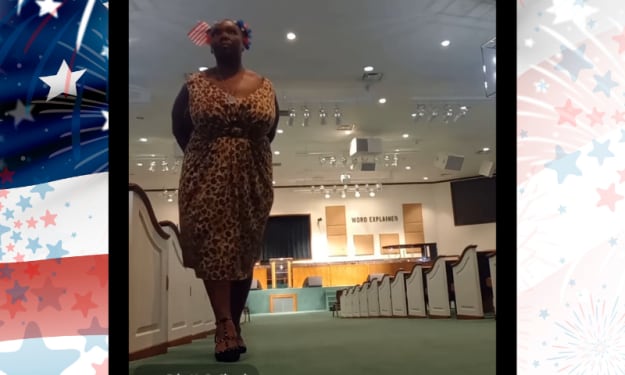Content warning
This story may contain sensitive material or discuss topics that some readers may find distressing. Reader discretion is advised. The views and opinions expressed in this story are those of the author and do not necessarily reflect the official policy or position of Vocal.
The First Amendment
Freedom of Speech and Expression-Alternative Media

Are you familiar with Senate Bill 17?
In Indiana, Senate Bill 17, which was signed into law by the Governor on March 13, 2024, requires age verification for online content that could be harmful to minors. The bill:
- Mandates adult websites to use age verification to prevent minors from accessing harmful content
- Allows parents or guardians to seek legal action for violations
- Prohibits the retention of personal information from age verification
- Permits the Attorney General to pursue legal action and impose civil penalties
Why has this not been discussed in detail on social media, the news, or the radio?
There are a few reasons why the Indiana Senate Bill 17 may not have been discussed on social media, the news or the radio:
- Lack of awareness: Many people may not be aware of the bill or its implications, which can contribute to a lack of discussion.
- Limited media coverage: The bill may not have received widespread media coverage, making it less likely to be discussed on social media, news, or radio.
- Political polarization: The bill's focus on age verification for online content and its potential impact on free speech and privacy may be politically polarizing, leading to a lack of discussion in some circles.
- Other news priorities: The news cycle is often dominated by more sensational or pressing stories, which may have pushed the bill out of the spotlight.
Despite the lack of discussion, the bill has been opposed by the ACLU of Indiana, who argue that it violates the First Amendment and exposes adult Hoosiers to harmful surveillance.
If all 50 states were to sign similar decrees, a worst-case scenario could include:
1. Nationwide censorship: Broad restrictions on online content, limiting access to information and ideas.
2. Total surveillance: Mandatory age verification could lead to mass data collection, compromising privacy and potentially chilling free speech.
3. Criminalization of speech: Strict regulations could lead to criminal charges for individuals who violate the decree, even unintentionally.
4. Stifling of dissent: Fear of repercussions could silence marginalized voices, limiting public debate and progress.
5. Unconstitutional precedent: Such laws could set a dangerous precedent, eroding First Amendment protections and paving the way for further government overreach.
6. Chilling effect on innovation: Overly broad regulations could stifle innovation and progress in the tech industry.
7. Potential for abuse: Government agencies or special interest groups could exploit these laws to silence opponents or maintain power.
8. Loss of global influence: The United States' reputation as a beacon of free speech and democracy could suffer, impacting global relations and diplomacy.
It's essential to continue advocating for our rights and promoting awareness to prevent such a scenario from unfolding.
These outlets often cover stories that mainstream media overlooks, and they have a strong focus on social justice, human rights, and free speech.
Additionally, consider reaching out to independent journalists, bloggers, and podcasters who cover topics related to free speech, press freedom, and human rights. They may be able to help amplify your message to a targeted audience.
Remember to research each outlet's focus, tone, and audience to ensure that your message aligns with their content and values.
List of Alternative Media Outlets
Your list of alternative media outlets includes several well-regarded sources known for their independent and diverse perspectives. Here’s a brief overview of each, highlighting their focus areas to help ensure alignment with your message:
1. The Intercept
theintercept.com
- Focus: Investigative journalism, government and corporate accountability, civil liberties, social justice.
- Tone: Critical, in-depth reporting on issues often underreported by mainstream media.
2. Democracy Now!
democracynow.org
- Focus: Independent news, social justice, human rights, environmental issues.
- Tone: Progressive, with an emphasis on grassroots movements and underrepresented voices.
3. The Guardian
theguardian.com
- Focus: Comprehensive news coverage, with a special emphasis on investigative journalism, environmental issues, and human rights.
- Tone: Liberal, often providing detailed and global perspectives.
4. Truthout
truthout.org
- Focus: Social justice, environmental justice, economic inequality, human rights.
- Tone: Progressive, aiming to provide in-depth analysis and advocacy journalism.
5. CounterPunch
counterpunch.org
- Focus: Politics, economy, environment, culture, and social issues.
- Tone: Left-wing, often featuring critical analysis and commentary.
6. The Nation
thenation.com
- Focus: Politics, culture, progressive issues, social justice.
- Tone: Progressive, offering deep dives into political and social issues.
7. Mother Jones
motherjones.com
- Focus: Investigative reporting, politics, climate change, social justice.
- Tone: Progressive, known for exposing corruption and advocating for reform.
8. The Progressive
progressive.org
- Focus: Social justice, civil liberties, labor rights, peace, and environmental issues.
- Tone: Progressive, with a strong emphasis on advocacy and activism.
9. In These Times
inthesetimes.com
- Focus: Labor issues, social justice, politics, economy.
- Tone: Left-wing, focused on issues affecting the working class and marginalized communities.
10. Consortium News
consortiumnews.com
Focus: Investigative journalism, foreign policy, civil liberties, and historical analysis.
Tone: Independent, critical of mainstream narratives, often focusing on government accountability.
Independent Journalists, Bloggers, and Podcasters
Focus: Specific niche interests such as free speech, press freedom, and human rights.
-Strategy: Engage with those who have a track record of covering relevant issues to help amplify your message to a targeted audience.
Research Tips:
1. Alignment: Ensure the media outlet’s focus and tone align with your message to maximize the impact and reach of your communication.
2. Audience: Consider the audience demographics of each outlet to tailor your message accordingly.
3. Contact: Reach out with a clear, concise pitch that highlights why your message is relevant to their readership or viewership.
By leveraging these alternative media outlets, you can effectively reach audiences that are engaged in social justice, human rights, and free speech issues, ensuring your message is heard by those most likely to act on it.
About the Creator
Denelsia Walker
Poet, Author, Musician, & Adult Enter Model. My Brand is HOEZBWINNING via Amazon Merch on Demand. Plus am an Amazon Influencer. Founder of Delcia Secrets Contoured LLC custom-made lingerie. Creator of International Poetry Whore FB Group.
Enjoyed the story? Support the Creator.
Subscribe for free to receive all their stories in your feed. You could also pledge your support or give them a one-off tip, letting them know you appreciate their work.






Comments
There are no comments for this story
Be the first to respond and start the conversation.